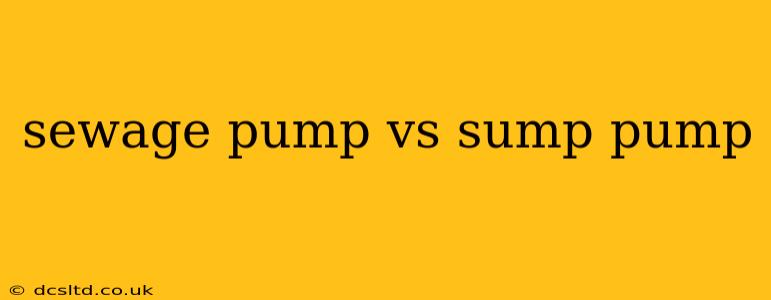Choosing between a sewage pump and a sump pump can be confusing, as both handle wastewater. However, they serve very different purposes and have distinct characteristics. This comprehensive guide will clarify the key differences, helping you select the right pump for your needs.
What is a Sewage Pump?
A sewage pump is designed to handle raw sewage, wastewater containing human waste, and other solids. These pumps are robust and built to withstand the abrasive nature of this type of waste. They're typically used in applications such as:
- Residential sewage ejection systems: These systems are necessary when the sewer line is located above the level of the house's plumbing fixtures. The sewage pump lifts the waste to the proper height for drainage.
- Commercial applications: Restaurants, apartment complexes, and other businesses often use sewage pumps to manage large volumes of wastewater.
- Septic systems: Sewage pumps can assist in moving wastewater from a septic tank to a drain field.
Key features of sewage pumps:
- High solids handling capacity: They can pump wastewater containing significant amounts of solids and debris.
- Durable construction: They're built to withstand harsh conditions and corrosive materials.
- Powerful motors: They need powerful motors to move the thick, heavy wastewater.
- Larger discharge pipes: To handle the higher volume and potentially larger solids.
What is a Sump Pump?
A sump pump is primarily used to remove groundwater or rainwater that accumulates in a sump pit, a waterproofed hole in the basement floor. These pumps typically handle cleaner water, although they can manage some small debris. Common applications include:
- Basement waterproofing: Preventing water accumulation in basements prone to flooding.
- Crawl space drainage: Removing groundwater that collects in crawl spaces.
- Handling minor leaks: Addressing minor plumbing leaks or seepage.
Key features of sump pumps:
- Relatively smaller size and lower cost: Compared to sewage pumps.
- Handles mostly clear water: Not designed for high solids content.
- Less powerful motors: Sufficient for pumping relatively clear water.
- Smaller discharge pipes: Suitable for the lower volume and cleaner water.
Sewage Pump vs. Sump Pump: A Comparison Table
| Feature | Sewage Pump | Sump Pump |
|---|---|---|
| Wastewater Type | Raw sewage, solids, human waste | Groundwater, rainwater, minor leaks |
| Solids Handling | High | Low |
| Motor Power | High | Lower |
| Construction | Robust, corrosion-resistant | Typically less robust |
| Cost | Generally higher | Generally lower |
| Application | Sewage ejection, commercial use | Basement waterproofing, crawl spaces |
How to Choose the Right Pump?
The choice between a sewage pump and a sump pump depends entirely on the type of wastewater you need to handle. If you're dealing with raw sewage or wastewater containing solids, a sewage pump is essential. If you need to manage clean water accumulation in a basement or crawl space, a sump pump will suffice.
What are the different types of sump pumps?
Sump pumps come in two main types: pedestal sump pumps and submersible sump pumps. Pedestal pumps sit above the sump pit, while submersible pumps operate underwater. Each type has its own advantages and disadvantages in terms of maintenance, noise levels, and cost.
What are the common problems with sewage pumps?
Common problems with sewage pumps include clogs from excessive solids, motor burnout due to overload, and seal failures. Regular maintenance, including cleaning and inspection, can help prevent these issues.
How often should I replace my sump pump?
The lifespan of a sump pump varies, but generally, they last 10-15 years. Regular maintenance can extend their lifespan, but eventual replacement is inevitable due to wear and tear.
Can I use a sump pump for sewage?
No, you should never use a sump pump for sewage. Sump pumps are not designed to handle the solids and harsh chemicals found in sewage, and attempting to do so will likely damage the pump and potentially create a health hazard.
By understanding the key differences and applications of sewage pumps and sump pumps, you can make an informed decision based on your specific needs, ensuring effective and efficient wastewater management. Remember to always consult with a qualified plumber or contractor for professional advice and installation.
